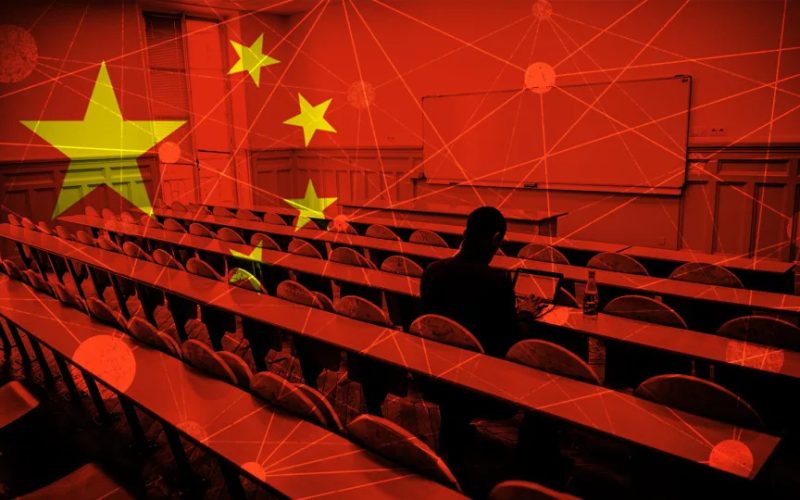Amid rising tensions between the United States and China, national security experts, along with lawmakers in the House and Senate, are concerned that the CCP's growing influence in American universities is not only strong but paying off in influencing the minds of young college students.
In a poll conducted by the Economist and YouGov in late March, around 35% of Americans 18 to 44 said they viewed China as an enemy, compared with 2% of individuals 45 and above.
Young Americans said they considered China "friendly," while some viewed the CCP as an "enemy." Only 4% of older Americans see Beijing as friendly.
Officials say that a large part of this attitude has to do with Confucius Institutes, which are public educational and cultural programs sponsored and organized by the Chinese International Education Foundation, an organization with links to the CCP's Ministry of Education.
However, following the creation of these institutes in the early 2000s, more and more reports have revealed the extent that the Chinese government has used the institutions to breach American National Security and indoctrinate college students.
According to the National Association of Scholars (NAS), there are 108 Confucius Institutes that have closed or will soon close, thanks in part to state governments enacting laws forcing universities to shut down such programs.
However, despite the closures of these programs, around 28 have replaced them with similar organizations, with 58 maintaining strong ties to their former Chinese-affiliated organization.
Reputable college universities with Confucius Institutes include Stanford University's Center on China's Economy and Institutions, which is part of the Freeman Spogli Institute and Stanford Institute for Economic Policy Research, headed by former U.S. Ambassador to Russia, Michael McFaul.
Other universities still containing such programs include Pacific Lutheran in Washington State, the University of Utah, and others.
The University of Utah announced that after the current contract expires, it plans to close its Confucius Institute in June.
Other universities like Pacific Lutheran in Washington State have not announced any plans to shut down their Confucius Institute and instead maintain a partnership with Sichuan University, which according to experts, is a major national public research university in Chengdu, Sichuan, China, which is currently on a U.S. government blacklist for allegedly aiding in China's nuclear weapons program.
"What we make of the concerns expressed by lawmakers is that these concerns are badly misplaced," said Paul Manfredi, a Professor of Chinese and Director of the Confucius Institute of the State of Washington (CIWA) at Pacific Lutheran University.
Asked if there was any new information to share regarding the issue, Manfredi noted that a new U.S. Government Accountability Office study in which he was personally interviewed several days ago is currently being prepared and published in the summer, with more details on the subject.
"PLU's relationship with Sichuan University goes back over 30 years, to a time actually before Sichuan University was so named," Manfredi told The Foreign Desk.
"During those decades, we have enjoyed connections ranging from the academic, in the form of student and faculty exchanges, to business, in the form of actual new businesses, to the simply personal (I am aware of at least one literal marriage born of this relationship and from the look of things, another on its way shortly)," he said, attempting to make the argument that the relationships go beyond the work of the center.
In early January, NAS published a report that experts believe officials at the Department of Defense (DOD) should use to determine whether an American university has taken the correct precautionary measures to address the influence of the Confucius Institute and receive waivers to host such an organization.
One measure includes subjecting Confucius Institutes to ensure that such organizations support American academic freedom, openness, and respectful behavior.
Experts recommend DOD officials mandate colleges to meet and comply with all requirements regarding information, data, physical, and research security.
Other measures include having the college maintain complete managerial control of such programs, financial oversight, and making it illegal to use foreign law concerning a written agreement related to the Confucius Institute.
Experts also say that Chinese students coming from China to American universities on student visas and into engineering and STEM programs pose a risk to U.S. National Security, especially given the latest announcement that the Chinese government mandated all college students to enlist in the armed forces.
Last week, hundreds of American and Chinese scholars and schools of experts gathered at Harvard College's China Forum to discuss the ongoing situation between the two countries and the opportunities for both sides to work together in areas like education.
"Academic institutions have been in the international sphere a kind of fifth estate," said David Leebron, President Emeritus of Rice University, to CGTN America, a Chinese state-affiliated media outlet."
"It has been another place where relationships took place with no government interference or regulation, but actually a little more freedom in that sphere, a little more opportunities for people to talk to each other, a little more openness on our campuses, and that really plays a vital role." "It lays a foundation for the future," he told the media outlet.
Following China's extreme COVID-19 lockdown policies and the protests in different universities, some American universities like Cornell and others have opposed partnering with Chinese schools, given the lack of academic freedom and openness.
Faculty and staff at Ohio's public universities share an opposite concern than Cornell, with academic officials worried that the legislature's anti-CCP stance and cancellation of Chinese institutions with universities could reduce the state's economy and educational opportunities.
Other influences that officials say have shaped young Americans' soft stance towards China include content on social media apps with strong affiliations to the CCP, like TikTok.
The Chinese government has also relied on young influencers to shape the minds of young Americans' views on China, like Freestyle skier Eileen Gu, who skied for China in the recent Winter Olympics and received glowing media spotlight from outlets like CNN. On social media, many pointed out that Gu was praising a country that has engaged in a bevy of human rights abuses and is an enemy of the U.S. and the international community.
Related Story: University That Housed Biden Center Pressed to End FBI China Spy Probe After Big Beijing Donations









